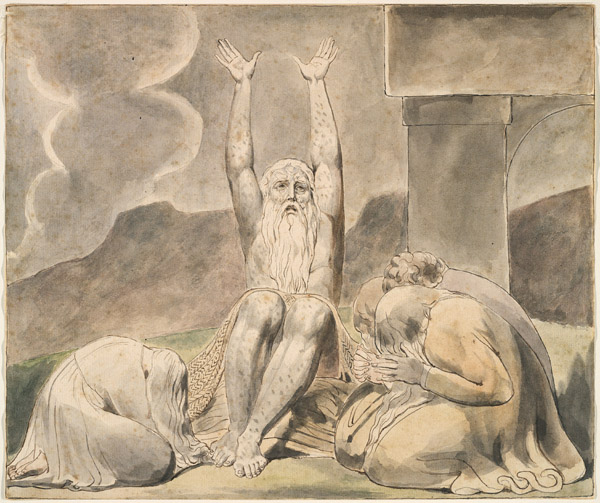
Chapter 8 (Wednesday of the First Week of Lent)
Then Bildad the Shuhite answered:
‘How long will you say these things,
and the words of your mouth be a great wind?
Does God pervert justice?
Or does the Almighty pervert the right?
If your children sinned against him,
he delivered them into the power of their transgression.
If you will seek God
and make supplication to the Almighty,
if you are pure and upright,
surely then he will rouse himself for you
and restore to you your rightful place.
Though your beginning was small,
your latter days will be very great.
‘For inquire now of bygone generations,
and consider what their ancestors have found;
for we are but of yesterday, and we know nothing,
for our days on earth are but a shadow.
Will they not teach you and tell you
and utter words out of their understanding?
‘Can papyrus grow where there is no marsh?
Can reeds flourish where there is no water?
While yet in flower and not cut down,
they wither before any other plant.
Such are the paths of all who forget God;
the hope of the godless shall perish.
Their confidence is gossamer,
a spider’s house their trust.
If one leans against its house, it will not stand;
if one lays hold of it, it will not endure.
The wicked thrive before the sun,
and their shoots spread over the garden.
Their roots twine around the stoneheap;
they live among the rocks.
If they are destroyed from their place,
then it will deny them, saying, “I have never seen you.”
See, these are their happy ways,
and out of the earth still others will spring.
‘See, God will not reject a blameless person,
nor take the hand of evildoers.
He will yet fill your mouth with laughter,
and your lips with shouts of joy.
Those who hate you will be clothed with shame,
and the tent of the wicked will be no more.’
Commentary
In the discourse which Job just finished, he had responded to the speech of Eliphaz. He showed Eliphaz was mistaken in a deep and efficacious way. But Bildad of Shuah, who agreed with the same opinion of Eliphaz, did not understand the profundity of Blessed Job and so he speaks against the answer of Blessed Job like people usually speak against the opinions they do not understand. For people who do not understand the minds of others speaking are usually deficient in two ways. One of these is because they do not know when the speaker arrives at the conclusion he proposes. Another is because they are not able to understand the order of the discourse of the speaker. This is clearly shown in the speech of Bildad when the text says, “Bildad spoke next, ‘How long will you go on talking like that?’” For Job seemed to him to talk too long because he did not consider or understand the conclusion Job wished to draw in his discourse. Similarly, he did not grasp the order of the things which Job had said, namely, how they had been connected to one another. So he continues, “and prolong the high spirit of the speech of your mouth?” For he concluded that because Job had explained many things whose order he did not understand that his words were haphazard like a man who has no ability to reason, saying various things without rational order, spurred on by the impulse of his spirit.
Also, since, as was said, Bildad did not understand the intention of Job, he takes his words in an entirely different way than intended and tries to deduce that they were not fitting. For in what he said, Job wanted to disprove the proposition of Eliphaz who thought that adversities in this world happened because of the sins of people and that if the sinners afflicted by God were converted, they would return to their former state of prosperity. So he spoke against both these ideas. Against the first he said, “Would that my sins and the calamity which I suffer were weighed in a balance!” (6:2) Against the second he said, “I have despaired; I will not live longer to any purpose,” (7:16) and many other things like this as is clear in the verses above. When Job said these things, he intended to prove that punishment for sinners and rewards for justice should be hoped for from God in this life. But Bildad did not know about the other life. So he took these words as though Job meant that God does not punish sins or reward good deeds, which seems contrary to divine justice. So Bildad makes his first proposition when he says, “Can God deceive judgment, or the Almighty falsify justice?” as if to say: This follows from your words if God punishes human beings in this world, though sinless or beyond the desert of his sins, or if he does not repay those turning back to him with good things. Note that justice is corrupted in two ways: by the cunning of an astute man and by the violence of a powerful man. There are, however, both perfect wisdom and omnipotence in God. Yet the name wisdom in God does not mean he overturns judgment like an astute man, nor does omnipotence in God mean that he subverts what is just like a violent man. (St. Thomas Aquinas)
Musical Selection
libera me, Domine, et pone me iuxta te et cuiusvis manus pugnet contra me.
Collect
look with favour on a people committed to your service,
and make us rich in good works,
that we who practice bodily penance
may also be renewed in spirit.
We ask this through our Lord Jesus Christ, your Son,
who lives and reigns with you in the unity of the Holy Spirit,
God for ever and ever. Amen.